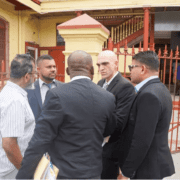The Top 10 Caribbean Passports For 2026
News Americas, NEW YORK, NY, Jan. 8, 2026: As global mobility becomes a strategic asset for investors, business leaders, and internationally mobile professionals, some Caribbean passports remain standout performers – offering a mix of travel access, tax efficiency, dual citizenship options, and personal freedom. The 2026 Nomad Passport Index (NPI), released this week by global citizenship consultancy Nomad Capitalist, ranks 199 citizenships using five weighted factors that go beyond visa-free travel to include taxation, global perception, dual citizenship acceptance and personal freedom.
While European and Middle Eastern jurisdictions dominate the global top 10 globally, with Malta in first place, followed by Greece, Ireland, and Romania near the top — several Caribbean nations continue to represent valuable passport options for those seeking international flexibility and economic opportunity.
Top 10 Caribbean Passport Rankings (2026)
Nomad Capitalist does not publish a dedicated Caribbean subset, but based on their overall 199-country index and broader passport strength data, Caribbean passports typically score solidly when evaluated alongside global benchmarks. Here’s the approximate ranking of Caribbean passports based on their relative strengths within the index and other global passport indices:
Caribbean PassportGlobal Mobility Rank (Visa-free) – Nomad CapitalistBarbados1st regionally (45th globally)St. Kitts and Nevis2nd (50th globally)Bahamas3rd (52nd globally)Saint Vincent & Grenadines4th (55th globally)Trinidad & Tobago4th (58th globally)Antigua & Barbuda5th (60th)Grenada6th (62nd globally)Saint Lucia7th (64th globally)Dominica8th (69th globally)Belize and Jamaica9th (101st globally)Guyana 10th (104th globally)
Caribbean passports have never featured in the global top 10 but their relative strength globally remains notable because:
Caribbean nations do not tax citizens on worldwide income, unlike the U.S., boosting tax efficiency scores.
Many Caribbean islands permit dual citizenship, making them attractive for global citizens.
Several, such as St. Kitts & Nevis, Dominica, Antigua & Barbuda and Grenada, offer Citizenship-By-Investment, (CBI), programs that rank well in investor criteria.
Why Caribbean Passports Matter More Than Ever
As geopolitical uncertainty grows, passports from small but strategic nations — especially Caribbean states with established CBI programs — offer more than travel perks. They are tools for wealth protection, lifestyle diversification, and global business access, particularly for entrepreneurs and investors seeking options beyond traditional Western powers.
The Caribbean’s growing role in the global mobility landscape reflects its synergy of tax-friendly citizenship frameworks, visa flexibility, and strong diaspora networks, making its passports a valuable consideration in the modern era of global citizenship planning.
Over the last 10 years, Anglo-Saxon giants like the United States, United Kingdom, Canada, and Australia never broke into the elite tier, remaining above average but failing to finish in the top five. The U.S. is currently stuck in 43rd under the weight of citizenship‑based taxation, while the U.K. has slipped to 35th as its non‑domicile regime has disappeared.
Investors and entrepreneurs are more likely to consider the United Arab Emirates and core European Union passports – headlined by Malta this year. The decade ends with a clear “barbell” strategy, as global citizens pair blue‑chip lifestyle passports with one or more efficiency passports or residencies, rather than chasing a single perfect passport.
The NPI was designed to educate aspiring global citizens about the true value of the world’s citizenships. While most indices – and most people – think of a passport only in terms of travel privileges, Nomad Capitalist recognizes that citizens of different countries deal with various requirements to pay taxes, comply with regulations, live freely, and avoid scrutiny when traveling. The NPI speaks to those seeking personal freedom and financial prosperity in a changing world by more deeply analyzing the true value of each passport.
Founded by Andrew Henderson, the original “Nomad Capitalist,” the boutique consulting firm supports over 150 high- and ultra-high-net-worth individuals each year, primarily from the United States. Since 2012, Nomad Capitalist has guided more than 1,500 clients – including numerous celebrities – from over 100 countries in obtaining second passports and citizenships, strategically relocating and building offshore wealth, and exploring pathways to legally reduce their tax burdens.
“Over the last decade, the Nomad Passport Index has empowered the world’s entrepreneurs and investors with the best possible information, so they can find the best possible passports for global citizenship,” said Khatia Gelbakhiani, Chief Growth Officer at Nomad Capitalist. “In 2026, Malta catapulted to the top of the list because of its favorable tax climate, dual citizenship offerings, and robust civil liberties. Year after year, it has become clear that Western countries like the United States and the United Kingdom are lagging behind, as global citizens pursue the barbell strategy and weigh a wide range of attractive alternatives like Malta. Our research shows that holding multiple citizenships and residencies is no longer a luxury; it is a necessity for success in the modern world. The most successful global citizens will go where they are treated best, and Nomad Capitalist will continue to support them every step of the way.”











